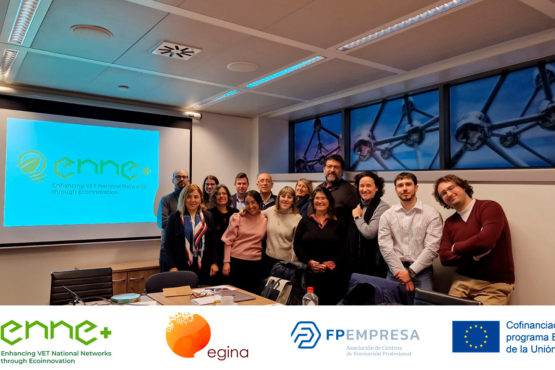The Association of Vocational Training Centres FPEmpresa has attended on 30-31 of January in 2024 the first face-to-face meeting of the European project ENNEPlus – Enhancing VET National Networks Through Ecoinnovation at the All Digital office in Brussels (Belgium).
This project is the successor of the previous ENNEPlus project and will run from 2024 to 2026. The aim of ENNEPlus is to enhance the capacity of VET providers to contribute to transformative and sustainable change in their local communities through networking, capacity building and challenge-based activities in the field of eco-innovation.
The project meeting was led by Egina (International Academy of European Fellowships), the project coordinator in Italy, and was attended by the other European partners, including WKO Steiermark and FH Joanneum from Austria; EfVET and All Digital from Belgium; Sereco from Italy; Innogestiona from Spain; and Apemeta and Arts & Skills from Portugal.
Empowering European VET networks through Eco-innovation
During the first session, participants learned about the specific objectives of the project and the work plan that will be followed during the process. In addition, the main dates of meetings and work deadlines were established, and the Social Hackathon, which will take place in Umbria (Italy) from 4 to 7 July 2024, was presented.
Afterwards, FHJoanneum presented the studies of its educational institution, the projects in which it participates and the different learning scenarios. Innogestiona explained their environmental role and how they approach their management and community participation in the ENNEPlus project.
During the second session, Egina presented the administrative management of the ENNEPlus project and explained how partners should present their activities. Subsequently, FHJoanneum showed the steps of the excellence assurance plan and the next tasks related to it, while EfVET shared the dissemination and communication plan of the work.
To conclude the meeting, the partners participated in the last activity, divided by countries to discuss other possible actors that could join the local actions. They also shared their social networks and told the partners about the activities and projects carried out by each of the organisations.




